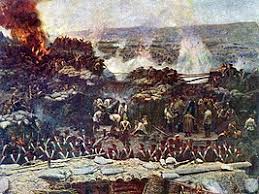“European Herald” – Karamzin magazine
 Creativity Karamzin in the years of the reign of Alexander I is of considerable interest. A sentimentalist writer, an individualist, essentially his temperament, who was first interested in mainly his sensitive soul — he appeared in the Alexander’s epoch as a public figure and publicist. Karamzin wrote and published a whole series of articles reflecting the living interests of our time in the journal “Vestnik Evropy” (1802-1830), the editor-in-chief of which was.
Creativity Karamzin in the years of the reign of Alexander I is of considerable interest. A sentimentalist writer, an individualist, essentially his temperament, who was first interested in mainly his sensitive soul — he appeared in the Alexander’s epoch as a public figure and publicist. Karamzin wrote and published a whole series of articles reflecting the living interests of our time in the journal “Vestnik Evropy” (1802-1830), the editor-in-chief of which was.
The program of this journal was much broader than the program of the Moscow Journal, which was distinguished exclusively by its literary character. The Herald of Europe was primarily a political body: questions of Russian life and the politics of European nations took first place in it. While devoting quite a few pages in his journal to questions of public life, Karamzin always put the interests of Russian society in the first place, pointed out his shortcomings, tried to awaken in him the consciousness of national dignity.
Karamzin himself was the main contributor to the articles in his journal, with particular attention he dwells on questions of public education (“Pleasant Views, Hopes and Desires of the Present Time”, “On New Education of Public Education in Russia”). All measures of the government in this direction (the establishment of educational institutions, especially rural ones, education of the Ministry of Public Education) meet in it a skillful interpreter for the public of their significance. He freely gives advice in his journal to the government, how to “have enough teachers in Russia”, makes instructions on the need for a methodical collection of civil laws. From the government, he demands respect for “public” opinion. The discourse of Karamzin “On the love of fatherland and national pride” draws in his face a mature citizen who loves his homeland and knows its past and present.
These moods of Karamzin are especially curious because he, in spirit, was a man of the 18th century, when worship of everything foreign in Russian society reached the extreme limits and led to indifference to his native. Obviously, there was a great coup of his worldview: from the “cosmopolitan” of that era, when Empress Catherine had already begun to preach patriotism, Karamzin became a “patriot” at the time when Alexander was “cosmopolitan” on the Russian throne.
The department of “foreign” policy in the “Bulletin of Europe” was filled with news about the most important modern European events and judgments about them. These “judgments” were not always original, they were often translated from the best foreign political magazines. Of course, the main place in this department was occupied by Napoleon, whose star then rose high. Karamzin treated him critically, once having responded about him like this: “it is clear that it is much easier to be a skilled general and a cunning politician than a great, that is, a heroically virtuous person.”
The literary department of the journal itself was composed mainly of translations of the best that were published in literature, in France, England, and Germany. Works Russian published here with a strict selection. On the pages of the “Bulletin of Europe” was placed the works of Derzhavin, Dmitriev, Vasily Pushkin, Zhukovsky, Karamzin himself. The critical department was absent: Karamzin’s attempt to introduce criticism into the pages of his former Moscow Journal was unsuccessful. “Good criticism,” Karamzin wrote now, “is the luxury of literature,” she is born “of great wealth, and we are not Croesus yet.”…



